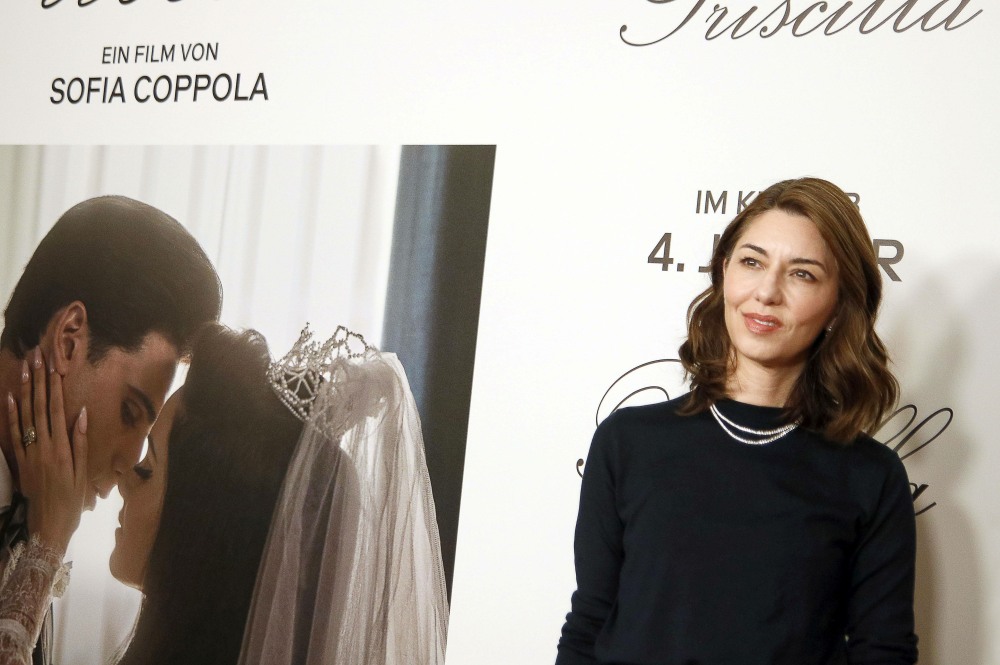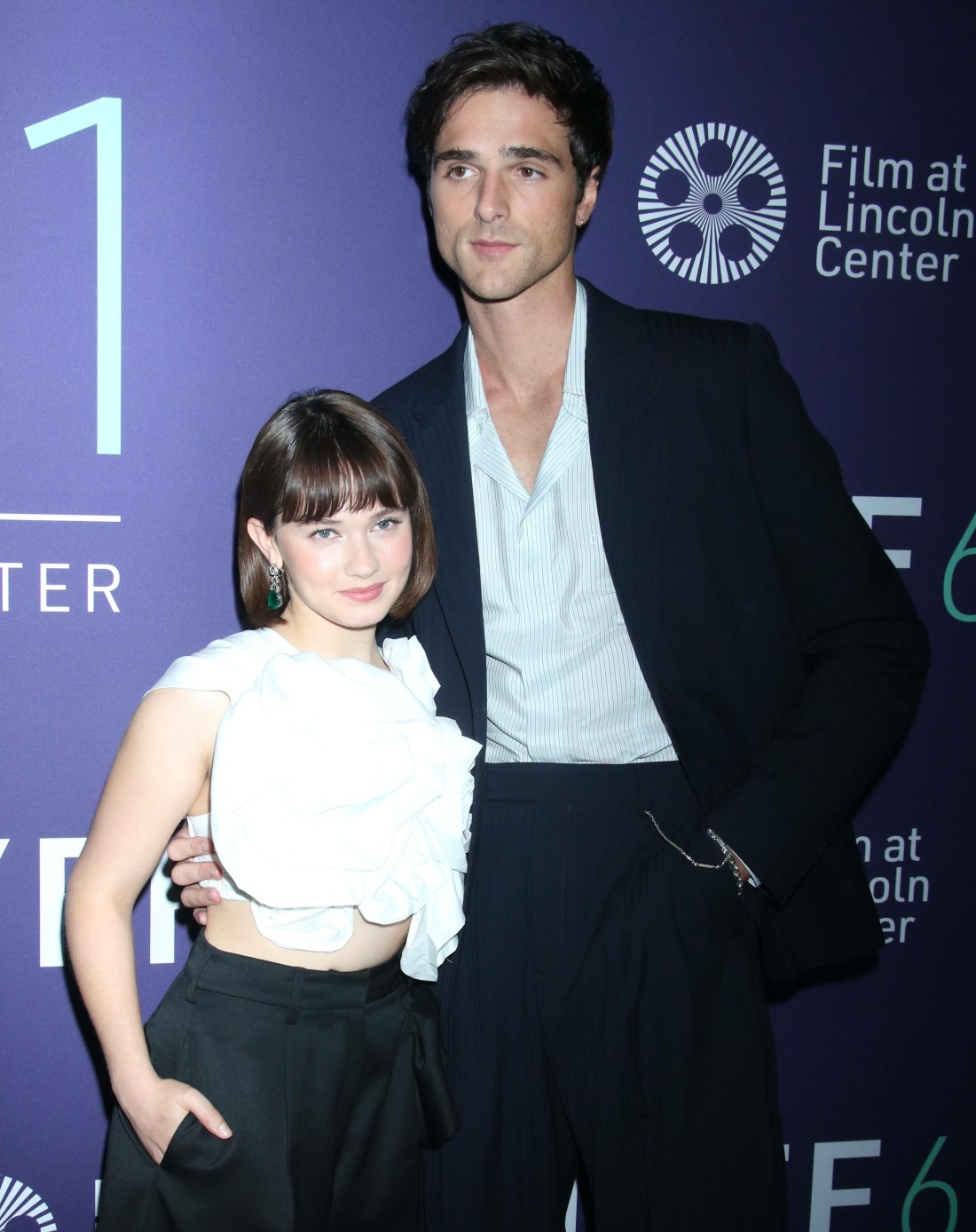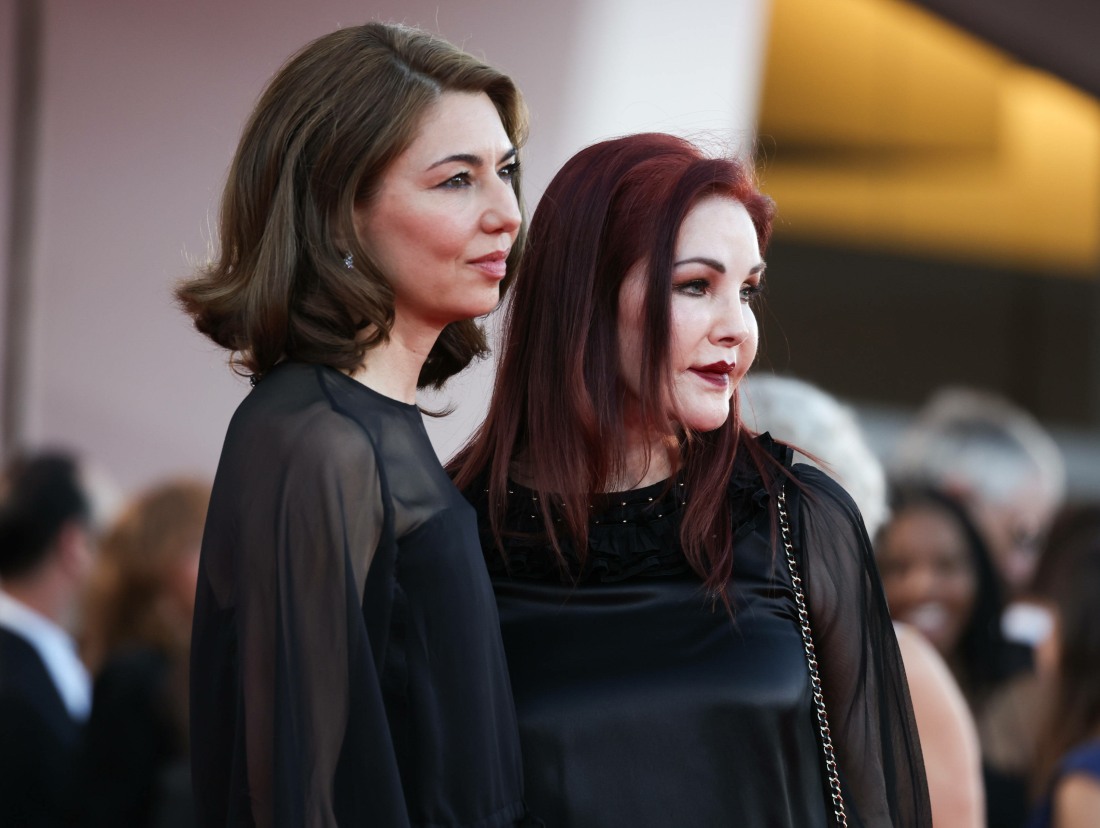I watched Sofia Coppola’s Priscilla this week and I was so impressed with it. The two lead actors were wonderful – Cailee Spaeny played Priscilla Presley and Jacob Elordi played Elvis. The film covered Elvis and Priscilla’s early “romance” in Germany, when she was just 14 years old, then throughout their relationship and marriage, up to Cilla telling Elvis that she was leaving him. The real relationship was creepy because of the ten-year age difference, and given the fact that Elvis was actively courting Cilla when she was 14, then taking her to Vegas and giving her pills when she was like 16 years old. Coppola walked a fine line between romanticizing this unsettling relationship and simply treating it fairly through Priscilla’s eyes, as the film is adapted from Priscilla’s memoir. Special mention for Elordi – he was genuinely brilliant as Elvis, and I preferred his Elvis to Austin Butler’s Elvis. Coppola was recently interviewed by the BBC about the film and how she’s still treated as a woman director. Some highlights:
Sofia decided to adapt Cilla’s book when she reread it a few years ago: “I was really surprised with how much I related to it and how vivid her story was. So then I called Priscilla up and she was open to it. I loved that it [the book] was so focused on her and their relationship and how intimate the story was.”
It’s important to tell women’s stories: “It’s really important to me to be able to show a female perspective. I’m happy there are more and more women directors, but it’s still such a small percentage.”
Comparing it to the other recent Elvis movie: “When I started working on this, they were talking about how Baz was making his: ‘Are you sure you want to do this as there’s already an Elvis movie?’ And I was like: ‘Even better, that’s so interesting that the culture is going to be focused on him and then a year later to see the same kind of story, but from her point of view… to have this counter balance.'”
Baz Luhrmann’s Elvis cost $85 million to make, Coppola’s film cost $20 million: “I just see all these men getting hundreds of millions of dollars and then I’m fighting for a tiny fraction of that. I think it’s just left over from the way the culture of that business is. It’s frustrating but I’m always fighting to get it and I’m just happy to get to make my movies independently and find people that believe in them.”
There’s an upside to having less in funds. “There’s a challenge and a freedom in making things small because if you have a big budget, you have a lot of input from studio executives, and I would never be able to make a movie like that. So I have that freedom. And then you have to be really crafty and it was really hard but I had the best team… we were able to re-use sets and I don’t know how we made so many costumes! It was all hands on deck and just having really creative department heads.”
The film was shot in 30 days: “I would have liked to shoot on film, but we shot digitally because we had to move so fast.”
Because there was no money, they couldn’t get the rights to any Elvis songs: “I originally wanted to have three Elvis songs, but I always knew that we might not be able to get them. I wanted it to really be focused on her [Priscilla’s] story… and to me it is really important to have Dolly Parton at the end, to have a woman’s voice at the end,” Coppola says. The film plays out to Parton’s track I Will Always Love You (the country star famously refused to let Elvis record her song after his manager Colonel Tom Parker insisted on half the publishing rights as well). Parton also said Priscilla told her that Elvis sang the song to her as they were on the way out of court following their divorce proceedings in 1973.
Coppola was glad she cast Elordi & Spaeny because they’re close in age in real life: The director says the fact her leading pair were a similar age – both in their mid-20s – helped her deal with the problematic topic of the age gap when Priscilla and Elvis began dating (she was 14 and he was 24). “When I was filming the scene where he first kisses her it really helped that Cailee is the same age as Jacob. It was tricky to get the tone right because I didn’t want it to feel creepy. I wanted it to be from her point of view, being romantic, but I had to turn off the side of my brain that’s a mother and an adult. She’s a young girl with Elvis, this rock star and what would that feel like? So you have to shift perspectives. I just always tried to go back to Priscilla’s experience and I thought if I could just show it through her perspective and suspend judgment, then hopefully after the movie it invites conversation.”
I looooved the use of Dolly Parton’s “I Will Always Love You” at the end. It was perfect, especially because of the backstory. As for the central “love story” – what was great about the way Coppola handled it was that it was truly through Priscilla’s perspective of a girl terribly in love with Elvis and desperate to be with him. It didn’t feel exploitative because Priscilla didn’t feel exploited at that time. The fact that Cilla graduates from high school and that’s the half-way point of the film and their relationship speaks for itself. Coppola’s love of romanticizing girlhood is used so effectively here, and I was pleasantly surprised by Coppola’s deftness as a director.
As for the money… I kind of love that Coppola stays in her lane, does her small-budget indie films and explores the stories she wants to explore. Priscilla genuinely looked a lot more expensive than the budget, especially with the costumes. I loved how all of Cilla’s clothes were their own narrative too, especially when she wore more prints in her 20s.
Photos courtesy of Avalon Red.
- Oxtober 06, 2023 Cailee Spaeny and Jacob Elordi attend New York Film Festival 61premiere of Priscila at Avery Fisher Hall Lincoln Center in New York. October 06, 2023 Copyright: xRWx,Image: 811911865, License: Rights-managed, Restrictions: imago is entitled to issue a simple usage license at the time of provision. Personality and trademark rights as well as copyright laws regarding art-works shown must be observed. Commercial use at your own risk., Model Release: no, Credit line: IMAGO/RW / Avalon
- Berlin – Premiere PRISCILLA im Delphi Kino Sofia Coppola im Interview Berlin – Premiere PRISCILLA im Delphi Kino Berlin *** Berlin Premiere PRISCILLA at the Delphi Cinema Sofia Coppola in an interview Berlin Premiere PRISCILLA at the Delphi Cinema Berlin Copyright: xEventpressxFuhrx,Image: 829368632, License: Rights-managed, Restrictions: imago is entitled to issue a simple usage license at the time of provision. Personality and trademark rights as well as copyright laws regarding art-works shown must be observed. Commercial use at your own risk., Model Release: no, Credit line: IMAGO/Eventpress Fuhr / Avalon
- Sofia Coppola bei der Premiere des Kinofilms Priscilla im Delphi Filmpalast. Berlin, 13.12.2023 *** Sofia Coppola at the premiere of the movie Priscilla at the Delphi Filmpalast Berlin, 13 12 2023 Foto:xA.xBuggex/xFuturexImagex priscilla_3213,Image: 829407010, License: Rights-managed, Restrictions: imago is entitled to issue a simple usage license at the time of provision. Personality and trademark rights as well as copyright laws regarding art-works shown must be observed. Commercial use at your own risk., Model Release: no, Credit line: IMAGO/Anita Bugge / Avalon
- Sofia Coppola bei der Premiere des Kinofilms Priscilla im Delphi Filmpalast. Berlin, 13.12.2023 *** Sofia Coppola at the premiere of the movie Priscilla at the Delphi Filmpalast Berlin, 13 12 2023 Foto:xA.xBuggex/xFuturexImagex priscilla_3211,Image: 829407043, License: Rights-managed, Restrictions: imago is entitled to issue a simple usage license at the time of provision. Personality and trademark rights as well as copyright laws regarding art-works shown must be observed. Commercial use at your own risk., Model Release: no, Credit line: IMAGO/Anita Bugge / Avalon
- News – Priscilla photocall – 80Â Venice International Film Festival Jacob Elordi, Sofia Coppola, Cailee Spaeny and Priscilla Presley attend a photocall for the movie Priscilla at the 80th Venice International Film Festival on September 04, 2023 in Venice, Italy.,Image: 830175296, License: Rights-managed, Restrictions: imago is entitled to issue a simple usage license at the time of provision. Personality and trademark rights as well as copyright laws regarding art-works shown must be observed. Commercial use at your own risk., Model Release: no, Credit line: IMAGO/Cinzia Camela / LiveMedia / Avalon
- News – Priscilla red carpet – 80Â Venice International Film Festival Sofia Coppola and Priscilla Presley attend a red carpet for the movie Priscilla at the 80th Venice International Film Festival on September 04, 2023 in Venice, Italy.,Image: 831574562, License: Rights-managed, Restrictions: imago is entitled to issue a simple usage license at the time of provision. Personality and trademark rights as well as copyright laws regarding art-works shown must be observed. Commercial use at your own risk., Model Release: no, Credit line: IMAGO/Cinzia Camela / LiveMedia / Avalon




















Sorry but she’s still a nepo baby who has received opportunities and funding also thanks to her surname unlike a woman with no ties to people in the film industry
Yes, but first of all, she’s exceptionally talented; she’s not just playing at movie-making. She also uses her privilege to make stories about women and create more opportunities for women.
Plus this is yet another thing that gets leveled more often at women. Nobody talks about Brandon Cronenburg as a nepo baby; they talk about how he’s just as, if not more talented than his father.
Technically, Sophia is an actual nepo-baby. Francis Ford Coppola cast her as the christened baby in The Godfather in 1972.
But seriously, she is an Acadamey Award nominated Director that has stood on her own for decades. EVerybody is related to somebody in Hollywood. Time and talent sets them apart.
sorry forgot to add, she is actually an Academy Award winner in 2004, Best Writing, Original Screenplay – Lost in Translation
She is still a great director. Just because she’s nepo doesn’t mean she should be written off. It’s those that are NOT talented that still get the job you should be worried about.
It says a lot that she’s the daughter of one of the most respected directors of all time and an accomplished director herself and still has to fight for budgets. You have to imagine what it’s like for women who don’t even have that — probably can’t even get a foot in the door.
Yet Black filmmakers get a tenth of the 20 million she averages.
I want to try and like this woman, but I can’t. She is too much with to minimum.
Enough with all the rehashing of Elvis. And Priscilla and Elvis.
And SC is talented but she IS a nepo baby director.
A fresh new comedy would be so welcome from HW.
I like Coppolla and I think she’s extremely talented, but her movies don’t make the kind of money that justifies a huge budget. That being said, plenty of male directors who get these huge budgets end up flopping, only to be given ANOTHER huge budget
Sorry but this movie was bad. The actors were good but the entire pacing and story focus was slow and lacking any true emotion. And she should have made it creepy. The way that Cilla was picked out at the diner to come to Elvis’ place was very disturbing. I get that it wasn’t creepy for Priscilla but that that doesn’t make it wrong from his intentions. It’s an interesting story that was not executed well and it showed that it was recorded on digital as it looked cheap.
I don’t know what larger artistic or cultural purpose Coppola’s choice to tell the story from Priscilla’s perspective — without any intervening auteurist distance — serves. Priscilla has already told her own story, in print. If we want that story, we know where to get it. Coppola’s job, as the filmmaker, is to show us how Sofia Coppola sees Priscilla’s story — or, even, how Sofia Coppola sees Priscilla’s vision of her own story.